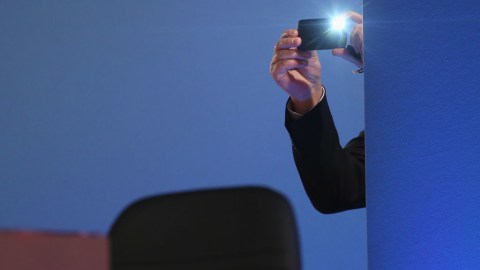The Secret Service is buying social media location data

Photo by Sean Gallup/Getty Images
- Documents reveal that the Secret Service used Locate X as part of a social media tracking package.
- The service “allows investigators to draw a digital fence around an address or area, pinpoint mobile devices that were within that area, and see where else those devices have traveled, going back months.”
- Other agencies that have used this service include the Immigration and Customs Enforcement, the Customs and Border Protection, the Coast Guard, and the Drug Enforcement Administration.
A popular, recurrent conspiracy theory: all humans will soon be microchipped so the government can track our every movement. This year, that idea was briefly attached to a potential COVID-19 vaccine, though the fear has long been present.
The irony, of course, is that we’re already chipped. We just call them phones.
We probably shouldn’t be surprised that the U.S. Secret Service contracted with a company to use the service, Locate X, in order to track Americans via social media. But they did, and once again we’re forced to distinguish between baseless conspiracies and the real-world consequences of government surveillance.
According to internal Secret Service documents, obtained from a Freedom of Information Act request, the agency paid the Virginia-based company, Babel Street, roughly $36,000 to include Locate X in a social media monitoring package that ultimately cost $2 million.
According to the trademark, Locate X provides:
“online, non-downloadable software used to collect, analyze, filter, store, track, manage, convert, interpret, categorize, index, extrapolate, compare, prioritize and produce databases, images, emails, files, documents, information, and data from online sources, websites and social media sites and to create reports in the fields of client-driven commercial, legal and governmental inquiries and investigations.”
And that’s only the first one-third of Locate X’s goods and services.
As early as March, Protocol reported on the dangers of Locate X. The deal with Babel Street “allows investigators to draw a digital fence around an address or area, pinpoint mobile devices that were within that area, and see where else those devices have traveled, going back months.”
Despite statements that claim these services collect large swaths of anonymous data, it’s possible to identify individual users. While the terms of use for Locate X states the data is “used for internal research purposes only,” it would be hard to believe the Secret Service is only interested in anonymous research.

Young players walk through the city centre of Hanover while holding their smartphones and playing “Pokemon Go” on July 15, 2016 in Hanover, Germany.Photo by Alexander Koerner/Getty Images
Besides, the Secret Service is not Babel Street’s only client. Others include the Immigration and Customs Enforcement, the Customs and Border Protection, the Coast Guard, the Drug Enforcement Administration, and others.
The Secret Service has apparently used Locate X to identify credit card skimming thieves. According to former employees of location-based companies that provide data to Babel Street, “the sale of personal location data from commercial firms to the government is more widespread and has been going on longer than previously known.”
In 1985, Neil Postman wrote about Orwell’s “1984” prophecy coming and going. In “Amusing Ourselves to Death,” the cultural critic noted that Orwell got a lot right, but with “Brave New World,” Aldous Huxley may have been the real winner when it comes to understanding the future.
“What Orwell feared were those who would ban books. What Huxley feared was that there would be no reason to ban a book, for there would be no one who wanted to read one. Orwell feared those who would deprive us of information. Huxley feared those who would give us so much that we would be reduced to passivity and egoism. Orwell feared that the truth would be concealed from us. Huxley feared the truth would be drowned in a sea of irrelevance. Orwell feared we would become a captive culture. Huxley feared we would become a trivial culture.”
There’s no need for a secret government plot to microchip us. Tech companies sold chips that we willingly bought; governments are simply purchasing the rights to locate them. That’s not a conspiracy. We’re staring straight into the truth every single day.
—
Stay in touch with Derek on Twitter, Facebook and Substack. His next book is “Hero’s Dose: The Case For Psychedelics in Ritual and Therapy.”





